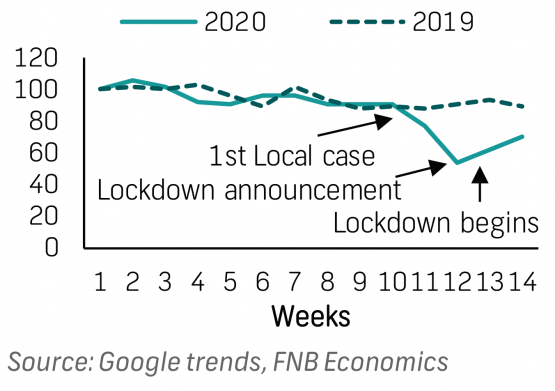No quick recovery as outbreak will ‘amplify already weakening trends’ in SA’s housing market.

Preliminary Deeds Office data from the March FNB Property Barometer shows that transaction volumes in the residential property market declined by an estimated 40% year on year in the first quarter. Re/Max, citing Lightstone Property data, says there has been a 10.5% decrease in transfers over the same period.
Decline in transaction volumes
This obviously largely covers the period before the countrywide lockdown was instituted on March 27.
With the Deeds Office and municipalities effectively shut, no transfers will take place in April.
While it is unlikely that a typical volume of sales will have been agreed in April, it is anticipated that the backlog caused by the lockdown may take months to clear, given that expired rates clearance certificates will require transfers to be relodged. This suggests the decline in the second quarter may be greater.
The bank expects “a sharp drop in transaction volumes, as buyers delay their purchasing decisions until the uncertainty lifts”.
“To put this into context, says FNB, “transaction volumes in China at the height of lockdown declined in excess of 90% y/y, before recovering as lockdown restrictions were lifted. While aggressive cuts in interest rates will eventually assist home purchasing activity, in the short term this will likely be outweighed by heightened uncertainty due to Covid-19 and second-round effects on the labour market”.
FNB expects a 4.5% contraction in GDP this year, which it cautions “will likely change as new data becomes available”. Other economists foresee a contraction of closer to 10%.
Job losses are estimated by FNB to be at least 360 000, which is on the lower end of multiple other forecasts which already see this number in excess of 1 million.
“For the property market, this will mean material pressure on demand and, by extension, the supply of mortgages and, ultimately, weakened house prices.”
It points to a reduction in supply as anecdotal evidence suggests spooked sellers have taken their homes off the market.
The lockdown has depressed already low levels of buyer interest because of the restrictions on movement.
Weekly web searches decline, but recovering
The bank’s economics unit has used web traffic to property portals to proxy interest so far this year, and notes that this “has reduced significantly since the first local case of Covid-19″.
“It is interesting to note that while the reaction in South Africa lagged behind the rest of the world, the decline in ‘for sale’ web searches was relatively sharper.”
Weekly web searches vs world
After Covid-19?
But there has been a rebound in web traffic since the lockdown started (which it highlights is a worldwide phenomenon).
“While too early to definitively draw conclusions, this could be an early indication of burgeoning bargain hunting by investor buyers and/or pent-up demand from first-time buyers looking to capitalise on potential distressed selling,” says FNB.
It says “empirical evidence suggests that pandemics tend to have a sharp but short-lived impact on property markets, and that volumes tend to suffer more than prices”. In developed countries like the US and UK, reports have implied that Covid-19 will have a “similar impact”.
But these countries are not directly comparable to South Africa. “Notwithstanding prospects for further interest rates reduction, the uninspiring employment outlook effectively limits any prospects for [any] pent-up demand in SA.” FNB emphasises that “weakening trends in SA’s housing markets were already underway, and that the virus outbreak will only amplify them”.
Pullback in supply and demand
“Looking ahead, we expect Covid-19 to have a sharp but short-lived impact on SA’s housing market. We expect that transaction volumes will, in the short term, take a bigger hit relative to prices. In contrast to international housing markets, however, the overall recovery in SA will likely be drawn out due to pre-existing weakness in consumer fundamentals.”
FNB’s House Price Index slowed to 2.8% year on year in March, which is “the lowest point since May 2011 (ie. in close to nine years)”. This takes the average house price growth to 3.1% in the first quarter, from 3.5% in the fourth quarter of last year.
After inflation, house price growth is negative and has been for some time. The bank’s market strength index shows that “the higher end market remains in excess supply, while the bottom end is still in structural supply-deficit”.
“We expect these dynamics to play a crucial role in determining house price paths this year.”
Brought to you by Moneyweb
For more news your way, download The Citizen’s app for iOS and Android.
Support Local Journalism
Add The Citizen as a Preferred Source on Google and follow us on Google News to see more of our trusted reporting in Google News and Top Stories.










